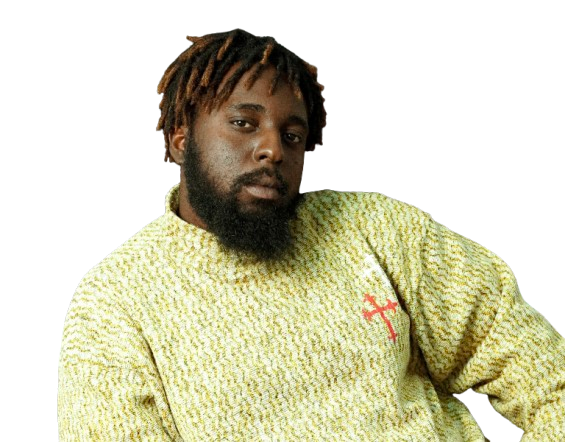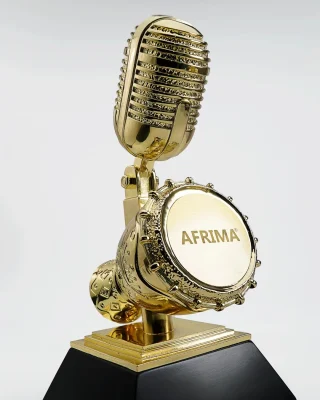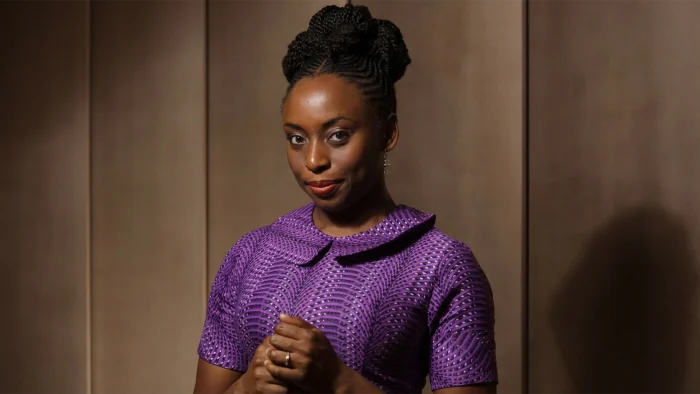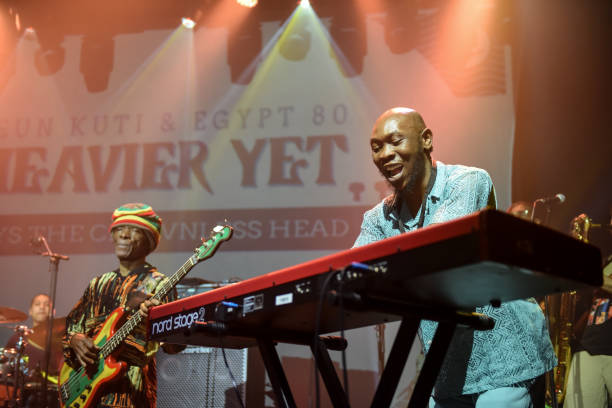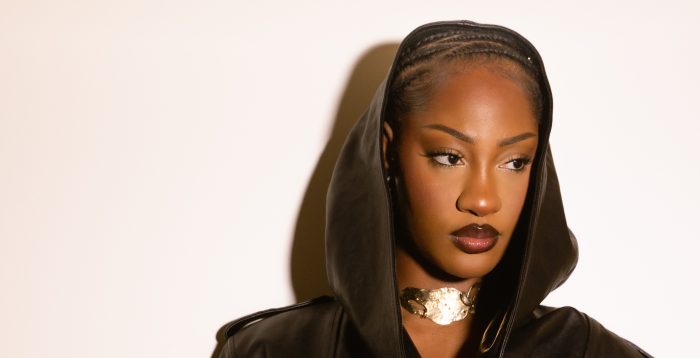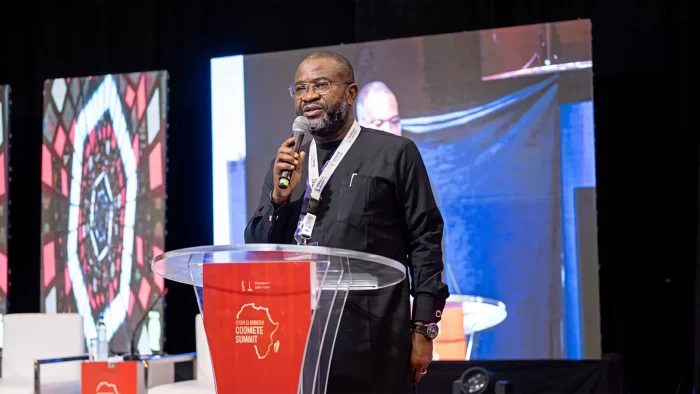Carrying the weight of a legendary name yet moving with quiet confidence, Made Kuti is charting his own path. With his new album Chapter 1: Where Does Happiness Come From?, he opens a new chapter of Afrobeat that is rooted in self discovery, hope and personal truth.
IT was a breezy Wednesday afternoon when Made Kuti walked into the recording set at Guardian TV Studios, donning a matching African print shirt with his wife, Inedoye. With a warm smile, the Afrobeat royal settled in for the chat, brimming with zest as he discussed his latest album, Chapter 1: Where Does Happiness Come From?
Made Kuti’s 16-track sophomore album trails his career sprint from his 2020 debut, Foreword, which established his humanist-leaning Afrobeat gospels. With a deeper dive into his meld of self developmental and socially conscious themes, the album unfurls with Made’s stylized Afrobeat which thrives for its eclectic fusions and tempered delivery.
On Chapter 1: Where Does Happiness Come From?, Made sings about one’s never-ending tussle with vices on I won’t run away, the gritty nationalist struggles of the average African on Oya; holding on to hope in Find My Way, the bond of family in Our Own and the will to resist society’s rot by improving one’s self in Story (with Femi Kuti), among other unique perspectives on the link between man and his environment.

The album rings with a textured balance of traditional Afrobeat instrumentation and modern eclectic fusions, pulsing with subtle Reggae, Jazz, Rock and Hip Hop influences. Made’s percussive-driven compositions, lush with spoken-word sections, scat singing, voice acting; and cinematic arrangements, keep the album charged with catharsis and offer a close glimpse into his stellar musicianship.
Following his training at London’s Trinity College of Music where Fela Kuti also studied, Made Kuti has since continued to sustain the Kuti Afrobeat heritage, performing across the world with his band, The Movement. With a Grammy nod for the Best Global Music album in his arsenal, he’s tactfully locked his pedal towards stardom with his optimism-fueled catalogue.
In this week’s Guardian Music edition, the multi-instrumentalist, composer and singer ushers us into his own unique Afrobeat world, detailing his sojourn as the latest Afrobeat torchbearer among the Kuti’s; his muses behind Chapter 1: Where Does Happiness Come From?; life as a newly wedded and his mission to create soul-searching classics.

Congratulations on your new album. What struck your mind when you titled it, Chapter One: Where Does Happiness Come From?
Well, the album is about 13 tracks long, and we have songs that I’ve been performing for about four years. A lot of the tracks were about self discovery, self awareness, progress, development, all those kinds of intrinsically personal issues. At the end of the day, when we face an existential crisis as humans, we are usually on a search for something like happiness. So, you might wonder: where does happiness come from? And at the end of a track I made with my dad, Story Time, the chorus at the end asked, Where does happiness come from? And I thought that it would be cool to answer that question with a Chapter one. My first album was titled, Foreword, and it’s only right that this is Chapter 1.
How long did it take to make this project?
We didn’t release it as early as we should have, about two years ago. Right now, I have enough songs for another album. It took us four years to get everything in place to be able to release it in a way that I would have been satisfied with.
Take us through your journey from music school till now
I graduated from a secondary school in Nigeria called Cailey in Nigeria. Then I went to London for seven years, and I did two things that were incredibly valuable to me there. I was learning classical piano intensively for three years. I didn’t touch any other instruments. And I did an ATCA diploma exam, and it gave me enough credits in addition to my A levels to go to where I really wanted to go, which was Trinity College of Music. The same school that Fela Kuti attended. I did a four year Bachelor’s in composition. Each year there came with a different sort of grading system for composition. For the first year, we did a small ensemble; I’m talking woodwind, four quartet, strings, piano and voice. Then for the second year, we did a medium ensemble. And then the third year was a large orchestra. Then the fourth year, which I really liked, was left to us to focus on whatever sequence we wanted. The school pushed me to be very experimental. It introduced me to composers and music that I’d never heard of before, and it really took me out of my comfort zone. Some of the teachers there were different. The thing about trinity is that every teacher is a professional in whatever field he or she teaches.
As someone who plays a diverse range of instruments, which is your favourite?
I don’t have one. I mostly use them for different purposes. For instance, on the song, Wait and See, I played a piano solo at the end. I did it because I think the sound was really pretty. And for a track like, Oya, which documents the Lekki massacre, I played a tenor sax solo at the end, because I felt that it should be more intense and aggressive.
There was something you did during a performance where you held a note on the sax for a long time
Circular breathing. My dad actually taught me how to do that when I was really young. He taught me using a straw. So, usually people think I’m holding my breath; but I’m not. I store air in my cheeks, then I blow for like a split second with the air in my cheeks. And as the air in my cheeks is pushing the air out, I quickly refill my lungs, and then I restore the air in my cheeks. It has to be very smooth, and I could breathe once every 10 seconds. My dad holds a world record for that technique. He did it for 51 minutes. It was incredible.
How do you draw inspiration for your music?
I tend to make sure that everything I write reflects my reality at that time. For instance, Oya was written during the Jos protests. My voice was written just after the elections. I won’t run away came up after I just discovered my temper and decided to work on it. So, it really reflects something that is happening at that moment.

What endears you to collaborate with another artiste?
I’ve been featured by PJ Morton. I have done a song with Morgan Heritage. I’ve worked with Runtown, Kida Kudz, Cavemen, Laycon and a few others. I’m very happy to work with people if they ask me to, but I am not driven to reach out to people, because my music is very personal. I don’t want to force anyone to think the way I think. Nonetheless, I’m already thinking about a couple of remixes for this album.
What was the most difficult track to create on this album?
I’d say I won’t run away because the arrangement is very complex and lengthy. The horns develop a lot. I played the sax throughout the song. So, that was probably the most demanding.
Tell us about your approach to stage performances
I just make sure I’m at the top of my game all the time. Growing up, I watched my dad take his craft very seriously. So no matter how tired I am, or even if I get sick, or if something annoyed me earlier in the day, the moment I get on stage I remember that I have a job to do. I focus on the satisfaction of the audience and my synergy with the band. So, no matter what show it is, whether big audience or small audience, it’s the same energy for me.
Any pre-performance routine?
I give thanks and ask that the ancestors protect me from bad equipment. The experiences I’ve had in Lagos have been incredible. There are some things that you can’t control.
What’s the most bizarre experience you’ve had?
One time we were at Moist Beach before the government took it down. The moment we got on stage, the kick for the drum tore. Then, the stage wasn’t leveled. My sax also fell down, and it stopped working as soon as I tried to blow it. Luckily, I switched to my tenor sax and tried to keep on with that one. It was 30 minutes of chaos, and the crowd was completely unaware of what was happening. As the artiste, it doesn’t matter what happens on stage, people blame you for any mishap.
How would you describe where you’re headed with developing the Afrobeat sound?
Afrobeat is a mixture of West African rhythm, traditional rhythms, and a lot of jazz influences. Fela usually writes the music including two guitars, two bass drums, and a massive horn section. His songs were usually divided by horn section, rhythm section, and then vocals, and then it progressed from there. My dad started to modernise it with synthesisers and his music was a bit faster. For me, I actually try to please both myself and the listeners when I’m writing. On a song like You can’t hide, I’m using an electric guitar to create some rock riffs, rather than a drum pattern at the beginning. In every section there’s something new. The horns don’t come in until much later. At the end of the song, there’s a climax, which hardly happened with Fela’s songs. With Fela, there’d be a climax at the beginning, then he’d introduce the music, sing, and then reintroduce it. It’s like an A-B-A structure, whereas I typically use A-B-C-D, and then finish with E. As long as I’m doing something differently, I’m happy.
Do you feel pressured at all, knowing the legacy you’re set to evolve?
Pressure tends to come when it’s external, but I don’t really listen to the noise. I’ve been blessed to have a personality trait where I am not too concerned about public opinion.
How has marriage shaped your experience as an artiste?
I’m a very easy going person. I generally don’t endeavor in things that are unnecessarily complicated. For example, I’m not an outgoing person, so you’ll never find me in the middle of trouble outside. I have a lot of responsibilities. I have to set a good example to my siblings. People say that when you get married a lot of complex situations occur, whereas it’s been the opposite for me; it’s been a lot easier. We fight less. The level of commitment we had when we were together is just certified through marriage. And so far, it’s been blissful.
What do you do when you’re not making music?
When I’m not making music, I spend a lot of time with my family because our compound is quite big. Everybody has his or her own space, own building, and once in a while, we will meet together and have dinner and talk. Then I play games a lot, though not as much as I used to before. I also enjoy watching anime.
What are your favourite video games?
I’m playing Ghost of Tsushima right now. God of war. I also play FIFA a lot.
What is one core memory you’ve held from the New Afrika Shrine?
One recent one that was beautiful to see was when myself, Uncle Seun and my dad got on stage and performed together. We all started our professional careers at different times. So, for the first time, the three of us played together on our own terms. I’m the youngest, Uncle Seun came after and my dad closed the show. We also held a note together for a long time on that stage. We came back after our solos and played Fela’s Water together.
Finally, what is the vision for Made Kuti?
To set a good example of what a professional career in music can be, one where artistry is prioritised, and being able to stay creative without leaning towards commercial influences. As an artiste, it’s our job to be daring, to take risks that people working 9-5 jobs might not be opportune to take, to search for things that they don’t have the time to search for, and in return, we can inspire them.

